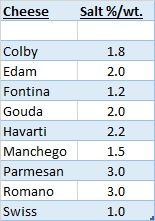It occurred to me after writing the above that there may be a simple way to figure a multiple to use with the "brining times" formula to achieve different salt content.... I dug around and found a table giving the typical salt content (% by weight) of commercial cheeses, and picked out the ones that are brined.... Here is a table showing the typical salt content of a few commonly brined cheeses....

I am wondering if you could use the above numbers as a multiple for the time calculated using the thickness and weight of a cheese, as follows....
Thickness of Cheese in inches = T
Weight of Cheese in pounds = W
Percent of Salt desired = P
Time in hours to brine the cheese = T x W x P
eg. for a 3" thick cheese weighing 6 lbs, where you want to end up with a 2.0 % salt content (eg. a Gouda), you would use....
Time = 3 x 6 x 2 = 36 hours
I know this formula is pretty close for my 2" thick, 2 lb. cheeses (I do a Gouda for 2 x 2 x 2 = 8 hrs.).... How do you think it will work for larger cheeses?....
Bob